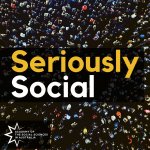As ironic as it sounds, loneliness is a universal experience. It can be self-inflicted, or imposed upon us. We can be surrounded by people and yet feel detached from society.
According to psychologist and social researcher, Hugh Mackay, founder of the Australian quarterly research series, The Ipsos Mackay Report, 25% of Australians report feeling lonely for most of every week. Mackay believes these numbers have increased in the current pandemic.
“In a sense, during Covid-19, we’ve been experiencing two pandemics. The virus itself, but also loneliness.
“If you look along your street or within your apartment block, it’s a pretty safe bet that roughly a quarter of those people are experiencing loneliness regularly,” Mackay says.
Mackay believes to reverse the “disease” of loneliness, the re-emergence of the value we place on neighbourhood is crucial and “will be one of great outcomes [of the pandemic],” he says.
By now, most of us are familiar with some of the most common symptoms of COVID-19, like fever and a dry cough. But Mackay believes we are less aware of the social side effects surrounding the pandemic and the real health risk associated.
“Social isolation is actually a greater threat to public health than obesity is. And that’s because of all these health implications that flow if people are isolated to the point of feeling lonely.
“We associate loneliness with anxiety and depression, but it’s also associated with other illnesses, like hypertension, a negative effect on the immune system, sleep disturbances, cognitive decline, greater vulnerability to addictions of all kinds, especially alcohol and information technology,” he says.
Mackay says that busy schedules and frequent technology usage increase our likelihood of feeling lonely.
“We’re all so busy. Busyness is the great barrier to social cohesion,” he says.
He believes the elderly and younger population are most prone to loneliness.
“Elderly people for obvious reasons such as being quite isolated. And young people because they are the heaviest users of technology.
“Information technology has had a fragmenting effect. It’s the great revolutionary paradox that said it’s going to make us all closer together, closely in touch with each other, which it has. And paradoxically, it’s made it easier than ever for us to stay apart from each other,” he says.
Despite the prevalence of loneliness in modern society, Mackay believes the pandemic has brought us closer together thanks to the power of community.
“I recently spoke to two young men, one from Melbourne, one from Sydney, who had each in their separate orbits, moved into new accommodation just before COVID-19 arrived.
“And in both cases, what they had done was put notes in the letterboxes of the people in their street to say, “Hey. I’ve just moved in. You don’t know me. Here’s my phone number. If you need a hand, if you need anyone to do some errands or go shopping or something else, just let me know, I’m here,” Mackay says.
Mackay believes that coming together in a time of crisis and understanding the importance of compassion is what will get us through the struggles of social isolation.
“In my apartment block, we had a balcony choir a few weeks ago. One inspired gent a few doors along organised us all at a particular time. He organised the music and we were out on our balconies at dusk with candles, singing along. Now, we didn’t all know each other before that, but we sure know each other, at least by sight, now,” Mackay says.
It’s community engagement like this that has boosted “an enormous amount of emotional security,” says Mackay.
“Once you realise what it means to be a human being, once you realise what it means to belong to a social species then it’s a very short step to say, “Well, in that case, we belong to each other. We’re all one. We’re all part of this thing,” he says.

